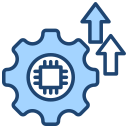The Impact of IoT on IT Career Landscapes
The Internet of Things (IoT) has rapidly transformed the global digital ecosystem, unveiling new opportunities and challenges for IT professionals. As billions of devices become interconnected, the demand for innovative talent and specialized skills within the IT industry has intensified. This dynamic shift is not merely technological but fundamentally restructures the way careers evolve, how roles are defined, and the competencies valued in the modern workplace. Understanding how IoT reshapes the IT career landscape is essential for both aspiring professionals and established experts seeking to stay ahead in an ever-changing environment.

Evolving Skill Sets in the IoT Era
As IoT devices proliferate, the need for specialized software and firmware development grows. Unlike conventional software, IoT solutions require engineers to write lightweight, highly efficient code that can operate within hardware constraints, ensure real-time performance, and integrate seamlessly with cloud infrastructures. Professionals must be adept at designing applications that can function reliably across heterogeneous devices—a challenge distinct from traditional desktop or web development roles. This demand leads to new career paths focused on embedded systems, edge computing, and cross-platform integration.


IoT Solutions Architect
An IoT Solutions Architect is pivotal in designing complex systems that integrate devices, networks, and cloud infrastructure. This role requires a holistic understanding of software design, hardware limitations, data management, and communication protocols. Professionals in this position act as a bridge between business goals and technological execution, ensuring that IoT solutions are scalable, secure, and aligned with organizational objectives. Careers as solutions architects often involve collaboration with cross-functional teams, making strong communication and project management skills essential.
IoT Platform Engineer
IoT Platform Engineers are responsible for building and maintaining the digital backbone of interconnected devices. Their duties encompass developing middleware, API integrations, and scalable platforms that can manage device communication, data collection, and remote device management. Unlike traditional system administrators, platform engineers in the IoT space must be adept at handling device heterogeneity, unpredictable network conditions, and real-time data flows. This expanding field offers excellent prospects for individuals interested in platform architecture and distributed systems.
Field Application Engineer for IoT
Field Application Engineers occupy a hybrid role, combining technical expertise with client-facing responsibilities. In the IoT context, they assist customers with implementing device solutions, troubleshooting technical issues, and providing feedback to product teams. This role often involves on-site visits, hands-on problem solving, and a deep comprehension of both the hardware and software components of IoT products. As organizations deploy complex IoT systems in real-world scenarios, the need for skilled field engineers who can bridge the gap between the lab and the field becomes increasingly vital.

Certification and Specialized Training
IoT-specific certifications from recognized authorities signal expertise to employers and help professionals stay abreast of technological advancements. Training programs often cover foundational knowledge, security best practices, and emerging standards. As organizations value practical, validated skills, pursuing industry-recognized credentials becomes a key strategy for career advancement, paving the way for both vertical growth and lateral movement into emerging IoT domains.

Online Learning Platforms and MOOCs
The proliferation of massive open online courses (MOOCs) and e-learning resources has democratized access to IoT education. Professionals can now stay competitive by enrolling in targeted courses offered by universities, industry leaders, or independent experts. These platforms provide flexible learning solutions that allow individuals to acquire cutting-edge skills while balancing work and personal commitments. The accessibility and relevance of online education are accelerating career transitions and ensuring that a global workforce can participate in the IoT revolution.

Corporate Upskilling Initiatives
Forward-thinking organizations invest in upskilling their workforce through bespoke training programs, mentorship schemes, and collaborative learning environments. These initiatives address the specific skill gaps related to IoT technologies while fostering innovation, employee loyalty, and organizational resilience. Participation in such programs enables IT professionals to adapt to new tools, methodologies, and security concerns, thereby enhancing their career prospects and contributing to the company’s overall technological agility.
